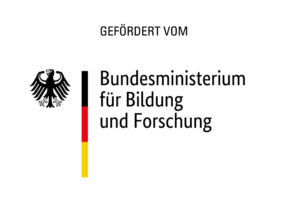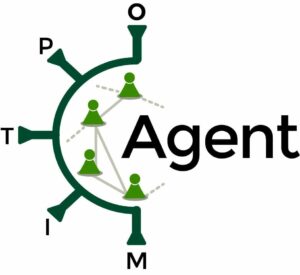OptimAgent
The primary goal of OptimAgent is to develop an agent-based model specifically designed to the German population for decision support during pandemics.
The project is divided into the phases “Conceptualization”, “Development & Analysis” and “Application” and includes six linked sub-projects, which are described in more detail in the following.
Subproject 1
Heterogeneity in contact behavior and utilization of preventive measures in different phases of an epidemic
Subproject 1 examines heterogeneity in contact behavior and compliance with nonpharmaceutical interventions and their impact on transmission patterns in the population.
The overall goal of Subproject 1 is to
1) better understand the heterogeneity and dynamics of contact network structures based on detailed analyses of pre-pandemic and pandemic contact data, and
2) assess the effects of using a more realistic contact network on the results of dynamic mathematical models at different stages of an epidemic of an airborne infectious disease.
Principal Investigator: Prof. Dr. André Karch, University Münster
Partner:
Prof. Dr. Rafael Mikolajczyk, Martin Luther University Halle-Wittenberg
Dr. Veronika Jäger, University Münster
Prof. Dr. Vitaly Belik, Freie Universität Berlin
Phuong Huynh, University Münster
Andrzej Krzysztof Jarynowski, Freie Universität Berlin
Chao Xu, Martin Luther University Halle-Wittenberg
Richard Pastor, NET CHECK
Steven Schulz, NET CHECK
Heterogeneity of in Socio-Psychological Antecedents of Health Behavior
Subproject 2 focuses on psychosocial aspects that influence health behavior and creates a module for generating artificial populations.
The primary goal of Subproject 2 is to improve the understanding of human behavior regarding pandemics. Specifically, the goal is to describe the German population using socio-psychological measurements that are suitable for agent-based modeling.
Principal Investigator: Prof. Dr. André Calero Valdez, University of Lübeck
Partner:
Lilian Kojan, University of Lübeck
Subproject 2
Subproject 3
Estimating heterogeneity in time and space – methods for model parametrization and learning
Subproject 3 develops a principled approach to derive time- and space-resolved epidemiological parameters from various data sources.
The main objective of Subproject 3 is to develop and apply a general parametrization framework of epidemiologic models to establish time- and space-resolved parameter estimates and distributions.
Principal Investigator: Prof. Dr. Markus Scholz, University Leipzig
Generation of representative and scenario populations for epidemiological modeling
Subproject 4 creates a tool for generating representative scenario populations for epidemiological models.
The primary goal of Subproject 4 is to provide open-source software for the generation of regional differentiated populations for epidemiological agent-based simulations. With this software, open-access populations are produced that mimic the heterogeneous structure of the German population, including health-related variables such as diabetes and cardiovascular diseases.
Principal Investigator: Prof. Dr. Jan Pablo Burgard, University Trier
Partner:
Prof. Dr. Ralf Münnich, University Trier
Soheil Shams, University Trier
João Vitor Pamplona, University Trier
Subproject 4
Subproject 5
Development of the German Epidemic Micro-Simulation System
Subproject 5 will develop an agent-based reference model for Germany that integrates work from Subprojects 1-4 and 6 and enables the simulation of complex scenarios.
The essential goal of Subproject 5 is to develop a modular and adaptable agent- based reference model to support decision-making during pandemics. The implementation will include
(1) a population module providing a complete representation of the German population including individual and regional heterogeneity in terms of sociodemographic characteristics and mobility, as well as selected individual psychological characteristics determining how individuals react to perceived risks and recommended or prescribed control measures for the epidemic
(2) a contact module to incorporate dynamically changing social network structures during a pandemic (contact kernels), and
(3) an intervention module providing functionalities for testing various contact-based (i.e. social distancing) and restriction-based (i.e. school closures) mitigation strategies.
This model will be coupled with a medical decision making module developed in Subproject 6.
Principal Investigator: Dr. Wolfgang Bock, University of Kaiserslautern-Landau
Partner:
Prof. Dr. Mirjam E. Kretzschmar, University Medical Center Utrecht
Prof. Dr. Tyll Krüger, Wroclaw University of Science and Technology
Prof. Dr. Bernd Hellingrath, University Münster
Johannes Ponge, University Münster
Dennis Horstkemper, University Münster
Dr. Johannes Horn, Martin Luther University Halle-Wittenberg
Dr. Sudarshan Tiwari, University of Kaiserslautern-Landau
Lukas Bayer, University of Kaiserslautern-Landau
Impact of synergistic interactions between exposure and vulnerability to infectious diseases on health inequalities and the effects of infection control measures
Subproject 6 will develop a decision analytic module that estimates the effectiveness and efficiency of alternative non-pharmaceutical interventions.
Primarily, Subproject 6 investigates how synergistic interactions between exposure and vulnerability (existing underlying diseases) to infectious diseases drive the risk of severe health outcomes, socioeconomic health disparities, and the effectiveness, efficiency, and equity of non-pharmaceutical interventions (NPIs). In this context, we will analyze the spread of infectious diseases between different socioeconomic groups and the potential role of these groups in supra-regional disease dynamics.
Principal Investigator: Jun.-Prof. Dr. Alexander Kuhlmann, Martin Luther University Halle-Wittenberg
Partner:
Dr. Berit Lange, Helmholtz-Centre for Infection Research
Dr. Isti Rodiah, Helmholtz-Centre for Infection Research
Prof. Dr. Beate Jahn, UMIT Tirol – Private University for Health Sciences and Health Technology
Prof. Dr. Uwe Siebert, UMIT Tirol – Private University for Health Sciences and Health Technology
Prof. Dr. Wolfgang Greiner, Bielefeld University
Maren Steinmann, Bielefeld University
Sebastian Gruhn, Bielefeld University

